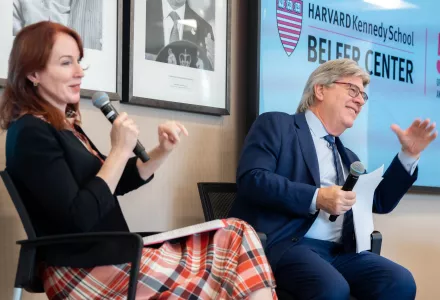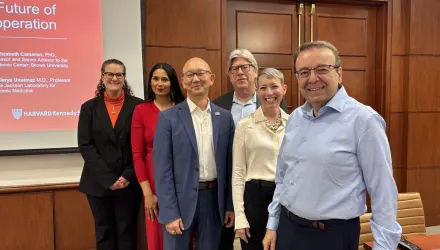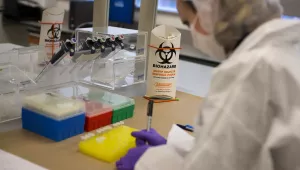What are the aims of this new Program?
J. Michael McQuade (MM): Ultimately, we want to create, or enhance, a cadre of science- and technology-literate policy makers and policy-literate scientists and technologists.
At a more granular level, we’re asking: what are the new challenges, opportunities, governance questions, and geopolitical landscapes in the areas where these emerging technologies and advanced sciences are working today? What new frontiers are they creating to which policies have to respond? And how can we at the Belfer Center leverage our incredible resources—expertise, energy, convening power, training opportunities, and more—to help shed light on this set of frontiers?
In effect, we're creating a new boundary surface between technology and policy. And how do we respond to that? What tools do we need? What capabilities do we have?
So for example, let’s talk about Large Language Models (LLMs), which are front and center these days. When we begin to think about policies related to those in terms of either control or enablement, they get complicated because we don't actually know what we can know just yet. So it would be great to say that everybody has to pass a minimum set of safety standards. We can ask an LLM a question, and we can decide whether we think that question is relevantly and correctly answered, but it's not yet clear technically whether we confidently answer questions about how the model has arrived at its answers. The technology is very new and very rapidly accelerating, and what we historically would have called our “test and evaluation” capabilities are not moving fast enough. So what do we have to build into these systems that allow us to verify them or validate them in new ways—while also supporting innovation in technologies that have such vast potential?
The obvious question on AI is, how do we need to think about policies, governance, and global norms, whether they're privacy policies, safety policies, or development priorities, for systems that are designed to evolve in the wild, and not in the lab?
Let’s talk more about emerging technologies. What do you mean by that? Which technologies?
MM: I think what we really mean is this set that has become really quite ubiquitous in our conversation: artificial intelligence, autonomy, and information sciences, such as blockchain and encryption.
We also mean bioengineering, synthetic biology, bio technologies in general, which are opening up new ways to produce compounds and molecules that can create specific and potentially individualized therapeutic pathways, or compounds and molecules that enable new, more general manufacturing methods.
I would also include in that set of emerging technologies some of the more advanced material technologies that we're going to use for new manufacturing regimes or new capabilities to build things in harsher environments.
And, of course, space as a general landscape, including intelligence in space, sustainability in space, energy production and/or use in space, and other issues.
So I think those are the kinds of technologies we're talking about, which are really emerging much faster than we're used to. They typically have a strong public sector investment component to the research associated with them, which is different than three or four decades ago, when frontline technology was primarily government-driven early-stage investment.
So why here, at the Belfer Center?
MM: Belfer is an extraordinarily capable, historical center of work on science, international affairs and geopolitics. This is where we create new governance ideas, new global dialog, and new expertise. We do that through detailed research, through convening, and through our educational experiences. There is so much to build on and there are so many already existing efforts in technology, science, and public policy that it is the ideal place to launch a program at that interface between science, technology, and geopolitics.
There's also a history, particularly under former Belfer Center Director and former Secretary of Defense Ash Carter, of understanding the importance of tying technology to policy. This has been in the Belfer DNA from the beginning and is still such a crucial element across so many of the Center’s programs today.
This is fertile ground for that conversation. It’s also important that this is in Boston and Cambridge: a place where many of these emerging technologies are being created or fostered or innovated, and so it provides us a really, really important intellectual community and an important proving ground for how we combine technology, policy, and geopolitics together. So we really anticipate building on the strengths of Belfer, Harvard, Cambridge, and beyond, and drawing on academic, policy, and private sector expertise. We’re in an ideal spot for work at the tech-policy frontier.
And why now?
MM: This particular collection of technologies at the frontline of science—bioengineering, software capabilities, AI capabilities—is developing at an accelerated pace compared to the speed at which we traditionally have created frameworks and the dialogue and participants in the policy landscape.
It's moving very fast, and if we do not have the skills and capabilities and tools and expertise to deal with these technologies and their geopolitical implications, it's only going to get faster in an unmanaged way. So speed is the big part of it, plus the global nature of how these technologies are emerging. We are working in recognition that we're living in a dynamic, multi-polar world where the United States is not the sole leader in the scientific community anymore, and there are lots of participants in this dialogue, and those participants often come from very different motivations. So another thing driving the ‘why now’ is to begin to establish the dialogues and the interfaces that allow us to be able to think about how we handle these policy issues in the future.
And of course, many of these technologies have very significant social implications. You can't talk about AI without talking about deep fakes, for example, or election interference. And given the ubiquity of these technologies and their uses, the number of individuals impacted either by the technology or the governance under which we choose to operate is enormous.
If we imagine the Program five years from now, what would you like to say you have achieved?
MM: One, it would be that we have clearly established a pipeline of leading experts in the field. And by experts, I mean people who are technically literate doing policy, and people who are policy literate doing technology. There are a number of ways I expect we will try to do this, so it would be great to have a recognizable pipeline well established in the coming years.
The second is that we have been successful at creating the visibility and the convening power to be an important place where those discussions are happening, and that means beyond just the students and the researchers, but experts from around the world, policy officials from around the world, government, governance officials from around the world. We aspire to be seen as a place that can effectively catalyze and host those conversations.
I also hope that we will be seen as a place that’s producing research on the most consequential questions in this space. Beyond that, it would be nice when I look at some AI-generated thing on the internet, to know whether it's true or not! But, you know, that's maybe a bridge too far. We’ll see.





